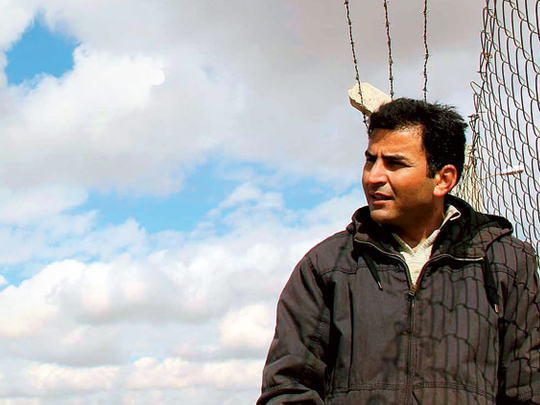
When did you first hear about Saeed Jaf, the subject of your film?
I first chanced upon the name Saeed Jaf in a weekly Kurdish magazine by the Iraqi Kurdistan regional government. Saeed Jaf had talked about himself and his past. The case was both interesting and unbelievable at that time. Back then I was busy pre-producing a project. But as I did more research, Jaf's case became more and more important to me. That was why I delayed the project I was dealing with.
What drew you to the project? Why did you decide to make this documentary?
During my research, I realised that Jaf was a well-known personality. Everyone knows about him in the smaller towns in Kurdistan. When I met with Jaf and saw 20 DVDs of witness testimonials, I realised that he must have been innocent. This was what drew me to make a film about the case. I remember Jaf saying, "Right now I feel that I'm at the bottom of a deep well and nobody can hear my voice. I'm going to be caught in the quagmire of working as a mercenary for the Iraqi Ba'ath party. Please help the world hear my voice. Let them all hear my voice and then come to a clear conclusion and then judge me."
Your past documentaries have dealt with the Kurdish community. Is this region and its people close to your heart?
To me Kurdistan is like an old, tired and injured mother; a broken-hearted mum full to the brim with stories and experiences. Her heart is full of untold tales. I think the Middle East is like one country and what happens here is inter-related, like in a single country. People in Kurdistan are worried about mercenaries and their past. However, they want people like Saeed Jaf to be treated right if it can be proven that they really saved people's lives during the violent campaign. According to the public prosecutor all Mostashar (the Ba'athist Kurd mercenaries), even Saeed Jaf, must be put on trial. My documentary puts forth the question: Is it possible, in a terrible system, to face a benevolent action?
Tell us a bit about your experience filming the documentary.
During the making of the documentary, the film crew was always welcomed by the people Jaf saved during the Al Anfal genocide campaign in 1988. There was a lot of respect for Jaf and for us as his guests. Although the crew was on the look-out for people who rejected Jaf's claims, we couldn't find anybody during the 24 days of filming. It's interesting to know that most Ba'ath mercenaries in Iraqi Kurdistan don't dare to be seen in public because they have the blood of Kurds on their hands. Kurds call them Jash or Mostashar and are eager to put them on trial. Most locals view them as Ba'athist and as Saddam Hussain's associates. The genocide against the Kurds left 182,000 civilians dead. Jaf seems totally different, although the documentary leaves the audience members alone to draw their own conclusions.
How difficult is it to get funding for projects like this?
At first there was no one to produce the project. I took care of all the filmmaking costs and expenditures on my own. But after I finished editing the film I received funding from the Documentary and Experimental Film Center in Tehran.
Will there be a DVD release of I am a White Mercenary?
Not yet. The distributor is negotiating on it with some international DVD rights buyers.
Where will I am a White Mercenary be screened this year?
It's been just two months since we began distributing the film. The first screening was at the Gulf Film Festival in Dubai in April this year.
What is your next project about?
Now I'm busy rewriting the script of my second feature film titled Baghdad's Goldsmith.


